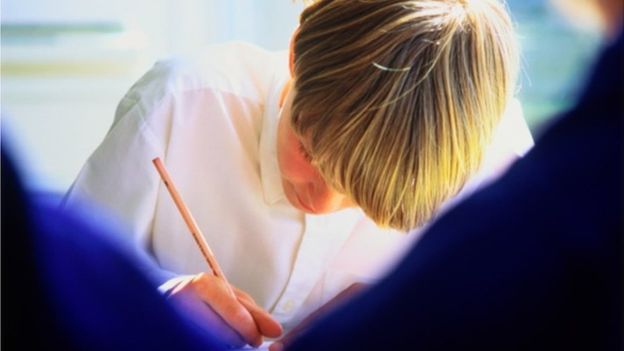Europa/ReinoUnido/BBC
Resumen: Dos quintas partes (39%) de los alumnos de primaria en Inglaterra han fallado en cumplir con el estándar esperado en lectura, escritura y matemáticas. Los resultados proceden de las pruebas del plan de estudios nacional, a menudo conocido como Sats. Los resultados indican que en total, el 61% alcanzó el nivel esperado en los tres «Rs», una mejora en la puntuación del 53% del año pasado . Ministros elogiaron el duro trabajo de las escuelas, pero los directores dijo que los resultados mostraron sólo una visión parcial.
Two-fifths (39%) of primary school pupils in England have failed to meet the expected standard in reading, writing and mathematics, figures show.
The results are from national curriculum tests, often known as Sats, sat by 11-years-olds earlier this term.
In total, 61% did reach the expected level in the «three Rs», an improvement on last year’s score of 53%.
Ministers praised the hard work of schools, but head teachers said the results showed only a partial picture.
The results show:
- 61% of pupils met the expected standard in reading, writing and mathematics, compared with 53% last year
- 71% of pupils met the expected standard in reading, compared with 66% last year
- 75% of pupils met the expected standard in mathematics, compared with 70% last year
- 77% of pupils met the expected standard in grammar, punctuation and spelling, compared with 73% last year
- 76% of pupils met the expected standard in writing, compared with 74% last year
This year’s cohort was the second to sit new tougher tests in line with a new national curriculum introduced in 2014.
Last year, the percentage of primary school leavers making the grade fell to 53% from 80% in 2015.
The results of the tests are used by the government to measure primary schools’ success, in so-called league tables.
‘Pinch of salt’
School Standards Minister Nick Gibb told BBC News the new curriculum had «significantly higher expectations of pupils than the previous one».
«Schools and pupils have responded extremely well,» he said.
«Today’s results show sustained progress in reading, writing and maths and are a testament to the hard work of teachers and pupils across England.
«Thanks to their commitment and our new knowledge-rich curriculum, thousands more children will arrive at secondary school having mastered the fundamentals of reading, writing and maths, giving them the best start in life.»
But the National Association of Head Teachers said the results should be taken «with a pinch of salt».
General secretary Russell Hobby said: «Sats data only gives parents part of the picture when judging a pupil’s success or a school’s effectiveness.
«League tables are the least helpful way of knowing if a school is the right place for your child.
«At the moment, parents and schools know that these results have to be taken with a pinch of salt.»
He added that simply looking at data missed most of the real work being done to help youngsters achieve their full potential.
Mr Hobby added: «Schools do need to be held to account, but inspectors should look at more than just data.
«That way, when parents are reading Ofsted reports they can have more confidence that the report properly reflects how good the school actually is.»
Dr Mary Bousted, general secretary of the Association of Teachers and Lecturers, said the results showed children and teachers had «worked extremely hard to get to grips with these new-look Sats».
«But Sats continue to have a negative impact on children’s education, and the exams are not fit for purpose,» she said.
«Preparing for Sats takes up too much class time, with schools focusing on getting children through the tests.»
Kevin Courtney, general secretary of the National Union of Teachers, said the results told 39% of 11-year-olds that they were not ready to begin secondary education.
«This demoralising situation says less about the efforts of teachers and pupils than about the deep flaws of our current system,» he said.
«Designed to hold schools to account, it treats primary children as collateral damage.»
Chris Keates, general secretary of the NASUWT, said pupils and teachers should be congratulated for their achievements.
«That this has been achieved despite the confusion created by the chaotic introduction of the new assessment framework, which barely a year after introduction is already under review by government, is of great credit to the resilience of the teaching profession,» he said
Fuente: http://www.bbc.com/news/education-40481689








 Users Today : 21
Users Today : 21 Total Users : 35460152
Total Users : 35460152 Views Today : 35
Views Today : 35 Total views : 3418818
Total views : 3418818